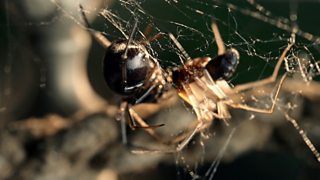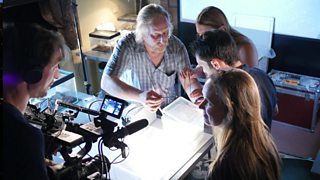Dr Tim Cockerill: from fleas to false widows

Entomologist Dr Tim Cockerill is a zoologist and circus performer. Here, he talks about his lifelong fascination with spiders and whether common prejudices against the creatures are justified.

I’d recommend that everybody takes the time to stop for a minute and just watch the spiders in their homeDr Tim Cockerill
When did you first become interested in spiders?
I’ve been fascinated since I was a tiny child, but my interest really developed in secondary school. I wanted a pet tarantula, but my mum wasn’t keen, so instead I got a snake, which she became quite attached to! That snake opened the floodgates for strange pets. At its biggest, my collection had hundreds of tarantulas, scorpions, weird snakes, assassin bugs and lizards.
What is it about spiders that you find so fascinating?
I think they’re fascinating because they’re doing the same things as most of us – trying to find somewhere to live, something for food or find a mate, but they do it in a way that is so different to humans. So we think they are completely alien creatures but in reality I think we’re probably the strange ones!
What was it like working in the Spider House?
It’s kind of how I imagined my future house when I was a 15-year-old so I was like a kid in a sweet shop! But really, it was a unique chance to spend time getting up close and personal with British spider species. I’ve spent time in the past studying tropical spiders, but it turns out our native spiders are just as interesting.
What was your favourite experiment?
It’s a toss up between seeing what happens when a spider gets flushed down the plughole and discovering how a spider’s web harnesses the power of static electricity to catch flies. I also liked seeing the effects of spider venom on human blood cells after just a few seconds.
What was your favourite spider behaviour that you saw at the house?
Ballooning! We weren’t sure whether we would be able to capture this behaviour but luckily, when we took these newly hatched spiders outdoors, the wind and temperature conditions were just right. The moment a tiny spider crawled to the end of my finger, made its parachute from silk and took off into the sky, was just magical. It was also was an eye-opener to see the mating behaviour of the false widow spider.
Should people be afraid of the false widow?
Not at all. These spiders are often blamed for a whole range of bites, stings and scratches, but they are actually very gentle creatures and will only bite in self-defence, or if provoked. Even then, their bite should generally feel no worse than a bee or wasp sting.
Do you have a favourite species of spider?
For me, my favourite species has got to be the diving bell spider, which we see up close in the bathroom of the Spider House. This spider dives below the water, trapping a bubble of air around its abdomen, which it uses as an underwater lung. It also webs, feeds, mates and even sleeps underwater. It’s a species that is completely unique - no other spider lives this aquatic life.
Why should people welcome spiders in their home?
You probably expect me to say spiders are good because they eat flies in your house but, having spent time in the Spider House watching the intricate and beautiful behaviour of these much-maligned animals, I’d recommend that everybody takes the time to stop for a minute and just watch the spiders in their home. You might be amazed at what you see.
You run a flea circus in your spare time. Was it different working with spiders instead of fleas?
Well! We uncovered such extraordinary spider behaviour in the house that I’m now considering starting a spider circus instead. More seriously, spiders are truly entertaining and fascinating creatures and, despite what many people think, they are not trying to bite you, whereas fleas usually are.

